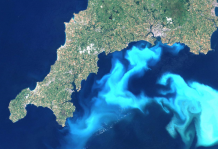Articles

Assessing the risks of harmful algal
blooms and impact on marine aqua
culture
IDSAI Research Awards & Exeter-Turing Pilot Research Grants: supporting data science & AI research in Archaeology, Biosciences and Education.
The IDSAI are delighted to announce that three research projects have been selected to receive IDSAI Research Awards and Exeter-Turing Pilot Research Grants.
IDSAI Research Awards and Turing-Exeter Pilot Research Grants aim to support early-phase development of ideas for innovative, interdisciplinary data science and AI research across Exeter. Academic members of staff from all Colleges were invited to apply for the time of an IDSAI Research Fellow to work with them on a pilot research project. Congratulations to all those involved in the projects who were successful in a very competitive selection process:
Assessing the risks of harmful algal blooms and impact on marine aqua culture
COLLABORATORS: Dr Theo Economou (Mathematics); Dr Ross Brown (Bioscience), Dr Ian Ashton (Renewable Energy); Dr Fabrizio Costa (Computer Science); Dr Ricardo Torres (Plymouth Marine Laboratory).
IDSAI Research Fellow: Oliver Stoner
Description: Aquaculture is the fastest growing food production sector globally and is vital for future global food security. SW England is a prime area for the expansion of shellfish farming. However, the uptake of biotoxins from naturally occurring Harmful Algal Blooms (HABs) into shellfish is a significant problem. The main risk is intoxication of human consumers, which causes various shellfish poisoning syndromes (from stomach upsets, to amnesia and paralysis).
The vision for this pilot research project is to make a step change in the accuracy of HAB risk prediction both spatially and temporally, thus facilitating operational and development planning for the UK (and wider) mariculture industry. Development of statistical models for predicting HAB risk and impacts on mariculture will have major academic and societal impact. Importantly this project will provide pilot data and key learning for the future development of mechanistic models that will be applicable over wider temporal and spatial scales, including future climate change scenarios.
Automated Detection of Hillforts in South West England Using a Machine Learning Approach
COLLABORATORS: Dr João Fonte (Co-I) and Dr Ioana Oltean (Archaeology), Professor Leif Isaksen (Digital Humanities) Dr Jacqueline Christmas (Computer Science) (Co-I); Dr Albert Chen (Centre for Water Systems); Jane Gallwey (Camborne School of Mines)
IDSAI Research Fellow: Ravi Pandit
Description: This project uses a machine learning approach to test the automated pattern recognition of, and data enhancement for Iron Age hillforts in South West England based on airborne laser scanning data.
Despite the recognition of their great potential the development of automatic detection methods applied to archaeological remote sensing is still in its infancy and limited to very simple morphologies. However, the increasing availability of remote sensing data of higher resolution, higher acquisition frequency and lower cost, demands a paradigm shift, where traditional man-made identification and mapping of archaeological sites cannot be the only option available.
The project will test the extent to which existing algorithms developed for other purposes can assist the detection in airborne LiDAR datasets of hillforts. The project proposes a meaningful solution to protect archaeological heritage and fight the rate of its destruction due primarily to development and climate change globally. If successful, this approach could be expanded and applied to other case studies involving similar archaeological objects elsewhere; other types of archaeological features; potentially other types of datasets (e.g. multispectral aerial and satellite imagery). This will be highly relevant in particular for cultural heritage management by national and local agencies in Britain and beyond.
Who Benefits in Policy Trials?
COLLABORATORS: Dr ZhiMin Xiao (Graduate School of Education) and Professor Mihaela van der Schaar (John Humphrey Plummer Professor of Machine Learning, Artificial Intelligence and Medicine, University of Cambridge & Turing Fellow).
IDSAI Research Fellow: Dmitry Kangin
Description: The use of large-scale randomised controlled trials (RCTs) are fast becoming “the gold standard” of testing the causal effects of policy interventions. RCTs are typically evaluated by the statistical, educational, and socioeconomic significance of the average treatment effect (ATE) on the study sample. Interventions that do not have a statistically significant ATE are often discarded as not meaningful and, as a result, usually not implemented more widely, partly due to the failure to recognise the difference between statistical and substantive hypotheses. However, while some interventions may not have an effect on average, they might still have a meaningful effect on a relevant subgroup of individuals, for whom the treatment is beneficial. In some cases, an intervention could thus still provide a net benefit if rolled out. Understanding and identifying for whom a treatment works is therefore critical for policy-makers and society at large.
Recognising the strengths of RCTs as a research and evaluation tool this project proposes an individualised approach to impact estimation. Thanks to recent development in machine learning and the increase in both quantity and quality of research data, it makes greater sense than before to estimate and compare treatment effects at individual and group levels, ultimately generating deeper insights into the causal treatment effects of tested interventions by uncovering what worked, for whom, and by how much. As in any research, the individualised approach, has its limitations. This project will look to validate the individualised approach using both simulations and empirical studies to help practitioners better understand the cutting-edge influence function based approach to the evaluation of machine learning algorithms for ITEs without the need to access counter-factual outcomes.
The next round of IDSAI Research Awards is due to open in autumn 2020. Please look out for more information about the Awards here.
Date: 4 May 2020
